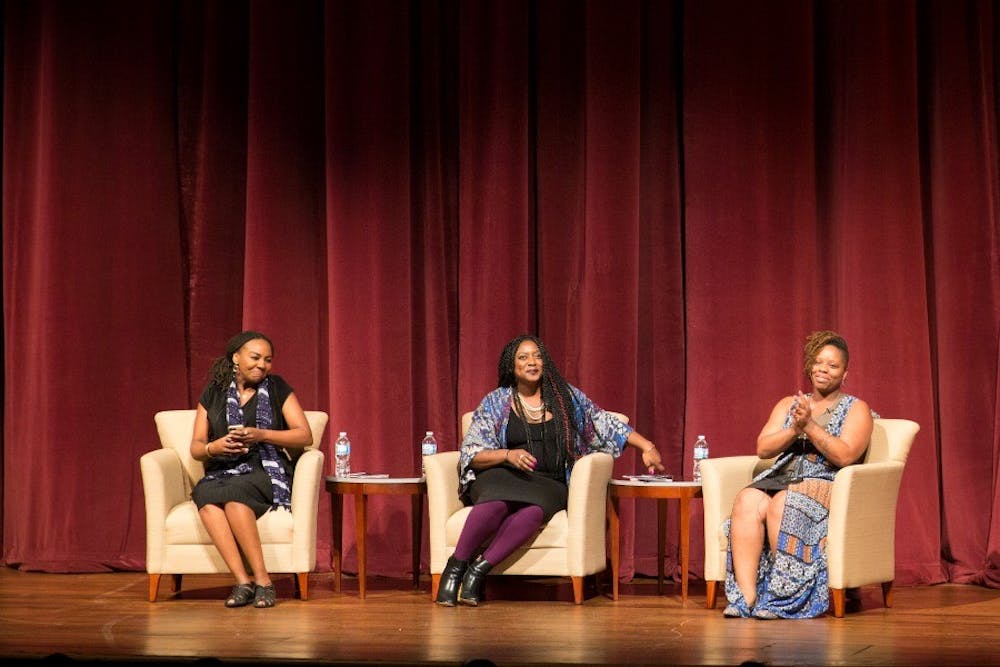A sold out crowd rumbled Hall Auditorium Monday night at the end of the #BlackLivesMatter discussion as part of the Miami Lecture Series.
After the Q&A, Patrisse Cullors, Alicia Garza and Opal Tometi, the founders of #BlackLivesMatter, had the crowd on their feet, repeating back to them, "It is our duty to fight for our freedom. We must win and and love each other. We have nothing to lose but our chains."
But the night started with the founders telling their own stories and how they came to fight for black lives.
Tometi, as the daughter of Nigerian immigrants, and the executive director of the Black Alliance for Just Immigration, found her roots in the immigration issue.
Being undocumented and black is a cauldron for disenfranchisement, Tometi said. Often a black person's first interaction with the police is because of that immigration issue.
"Who is black?" Tometi asked. "All these systems affect the most marginalized blacks."
For Garza, she spoke about how George Zimmerman's acquittal for the killing of Trayvon Martin in Sanford, Florida in 2012 shook her.
A child was murdered, they can't not be held accountable, Garza said.
"Each of us were rocked in a particular way. I wanted somebody to be held accountable for taking the life of a child," Garza added.
The killing of Trayvon Martin and the subsequent acquittal, signaled to Garza that black lives didn't matter. Garza took to social media to process her feelings and reject the defeatism she saw that nothing would change or that black people, like Trayvon, were responsible for their deaths.
Then it was Cullors who created the #BlackLivesMatter hashtag, which in the three years since, has spawned into a national movement with 28 chapters.
Which was the important point, Garza said, because real action is what's most important.
"Clicking 'like' doesn't get us closer to justice," Garza said. "Retweeting doesn't get us closer to justice."
It's a movement, Cullors, Garza and Tometi said, that is about standing up to state-sanctioned violence against black people and for the love of people and society.
"When we say all black lives matter, we mean all black lives," Tometi said.
As queers, Cullors and Garza, wanted to make that clear, too. #BlackLivesMatter is an intersectional movement, Cullors said.
It's a movement where leadership takes different forms, where they don't need Al Sharpton or Jesse Jackson to tell their stories, Garza said. And where respectability politics, like "pull up your pants," are challenged.
"The only way we are going to get free is if every one of our black lives are free," Cullors said.
Then Cullors flipped the script when she turned to the audience and asked each member of the audience to ask the person next to him or her, "What have you done for black lives today?"
Cullors, like Garza, was also more interested in active solidarity, rather than theoretical solidarity, which is why she posed that question activity for the audience.
"If you feel disconnected, you should connect to something," Cullors said.
By 13, Cullors had seen most young black boys her age arrested and incarcerated. Her own brother was incarcerated at 19. And her dad, influenced by the Black Panthers, showed her the black power fist.
However, to maintain her sanity and agency - to find if there was something more than these outcomes - she started organizing 15 years ago.
Black folks know state violence intimately, Cullors said.
"The system was not meant for us," Cullors said. "It was meant to kill us."
Toward the end of the Q&A, Garza addressed what she felt was the elephant in the room: the question of "all lives matter" vs. "black lives matter."
"I know you want to talk about 'all lives matter,'" Garza said. "You'll talk about it on Yik Yak tomorrow."
But she said, yeah, all lives matter.
"We are all working for a world where all lives are valued," Garza said. "But that's not the world we live in now."
One questioner in the audience wanted Garza to address the perception that black people were inferior. Garza sat up in her chair, emboldened.
"I want to talk about black excellence, not black inferiority," Garza said. "We're excellent by the very fact that we're still here."

